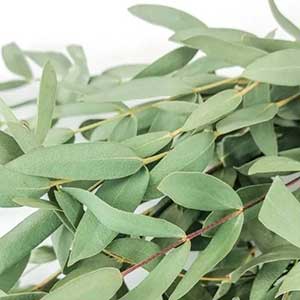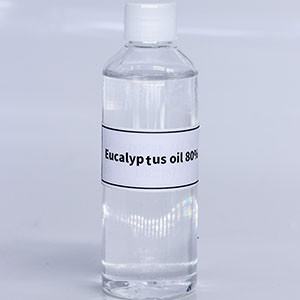The Brief Introduction of Eucalyptus Oil (Eucalyptus Globulus).
Eucalyptus Globulus is extracted from the leaves of the Eucalyptus globulus plant. Eucalyptus is a large evergreen tree native to Australia. Its leaves are rich in essential oil components and are the main raw material for extracting oil. Globally, the main production areas of eucalyptus oil include Australia, the Mediterranean region, South Africa, South America, as well as Guangxi, Yunnan, Sichuan and other regions in China.
Eucalyptus oil mainly adopts steam distillation. This method utilizes the high temperature of water vapor to evaporate the components in the leaves of Eucalyptus globulus, and then condenses the vapor into a liquid through a condenser. Pure Eucalyptus oil is obtained through oil-water separation. It can effectively extract active ingredient from Eucalyptus leaves while retaining their unique pharmacological and aromatic properties.This article mainly talked about Eucalyptus oil extracted from Eucalypyus Globulus.

The Main Chemical Components of Eucalyptus Oil
1. 1,8-Eucalyptol: It is one of the most abundant components in Eucalyptus Oil, with a strong camphor aroma. It has antibacterial properties against various bacteria, which makes it widely applicable in the field of medicine. In addition, 1,8-Eucalyptol has significant anti-inflammatory effects, which can reduce inflammatory reactions and alleviate pain and discomfort caused by inflammation.
2. α- Pinene: It has a certain proportion and has sedative, anti-inflammatory, and expectorant effects.
3. Citronellal: It has a relatively low content in eucalyptus oil made from Eucalyptus globulus and is the main component in Eucalyptus Citriodora, which can prevent and control pests.
4. Terpenoids: such as α-pinene and β-pinene, typically have anti-inflammatory and antioxidant effects
5. Other ingredients: usually associated with antibacterial and antifungal activity.
Is Inhaling Eucalyptus Oil Safe?
Inhalation of eucalyptus oil is generally considered safe when done properly. It is commonly used in aromatherapy to alleviate respiratory issues such as colds, coughs, and congestion. It has strong anti-inflammatory and decongestant properties that help clear the airways and promote easier breathing.
To safely inhale it, add a few drops of the oil to a bowl of hot water, then cover your head with a towel and inhale the steam for about 5-10 minutes. Alternatively, you can use a diffuser to disperse the oil into the air. However, it’s important to avoid direct inhalation of undiluted oil, as it can cause irritation to the respiratory tract. Special caution is also advised for individuals with asthma, young children, and pregnant women, as they may be more sensitive to the effects of eucalyptus oil. Consulting with a healthcare provider before use is always a wise precaution in these cases.

Is Eucalyptus Oil Safe to Eat?
It should not be ingested. While eucalyptus leaves have been used in traditional medicine in small amounts, the essential oil is highly concentrated and can be toxic if consumed. The high eucalyptol content is the primary cause of its toxicity. Even small amounts can lead to adverse effects. It is also important to keep it out of reach of children and pets to prevent accidental ingestion.
Can Eucalyptus Oil Make You Sleep?
Eucalyptus oil is not typically known for its sleep-inducing properties like lavender or chamomile, but it can still contribute to better sleep indirectly. By alleviating respiratory issues such as nasal congestion or coughs, it can create a more comfortable sleeping environment. When you can breathe easier, you’re more likely to sleep better.
How Do You Use Eucalyptus Globulus Oil?
1. Aromatherapy: Adding eucalyptus oil to a diffuser or using it in steam inhalation can help alleviate respiratory problems and clear nasal passages.
2. Topical Application: When diluted with a carrier oil, it can be applied to the skin to relieve muscle aches, joint pain, or to treat minor cuts and wounds.
3. Massage: Eucalyptus oil can be added to massage oil blends to soothe sore muscles and reduce tension.
4. Household Cleaning: Due to its antimicrobial properties, it can be added to cleaning solutions to disinfect surfaces and eliminate odors.
Which is Better, Eucalyptus Globulus or Eucalyptus Radiata?
Eucalyptus Globulus and Eucalyptus Radiata are two popular varieties of eucalyptus oil, each with distinct characteristics:
1. Eucalyptus Globulus: This variety has a higher concentration of eucalyptol, making it particularly potent as a decongestant and antiseptic. However, its strong scent and intensity might be overwhelming for some people, particularly those with sensitive skin or respiratory conditions.
2. Eucalyptus Radiata: Known for its milder aroma, Eucalyptus Radiata is gentler on the skin and respiratory system. It is often preferred for use with children, the elderly, or those with sensitivities. While it’s slightly less potent than globulus, it is still effective for respiratory support and is more versatile in aromatherapy.
Choosing between these two oils depends largely on individual needs and sensitivities. Eucalyptus Globulus is ideal for those needing a stronger, more concentrated oil, while Eucalyptus Radiata is better for those seeking a gentler option.
What is Eucalyptus oil Used for in Medicine?
1. Respiratory Relief: Eucalyptus oil is a common remedy for colds, bronchitis, and sinusitis due to its ability to reduce inflammation and clear mucus from the airways.
2. Antiseptic and Antimicrobial Uses: The oil is effective in treating minor wounds, cuts, and burns, helping to prevent infection and promote healing.
3. Pain Relief: Eucalyptus oil’s anti-inflammatory properties make it useful for relieving muscle and joint pain when applied topically.
4. Oral Health: Eucalyptus oil is found in some mouthwashes and toothpastes due to its ability to fight oral bacteria and freshen breath.

How to Use Eucalyptus Oil for Cough and Cold?
1. Steam Inhalation: Add a few drops of eucalyptus oil to a bowl of hot water. Cover your head with a towel and inhale the steam to clear your nasal passages and reduce congestion.
2. Chest Rub: Dilute eucalyptus oil with a carrier oil and apply it to your chest and throat. The vapors will help open your airways and soothe a cough.
3. Diffuser: Use a diffuser to spread eucalyptus oil throughout your room, which will help you breathe easier while you sleep.
4. Bath: Add a few drops of eucalyptus oil to a warm bath to relieve cold symptoms and relax your muscles.
Conclusion
Eucalyptus globulus is a powerful essential oil with a wide range of uses, from relieving respiratory issues to treating minor wounds and alleviating pain. However, it is important to use it safely, especially when it comes to inhalation and topical application. While Eucalyptus globulus is highly effective, those with sensitive skin or respiratory conditions might find Eucalyptus radiata to be a gentler alternative. By understanding the benefits and precautions associated with eucalyptus oil, you can make the most of its therapeutic properties in your health and wellness routine.

